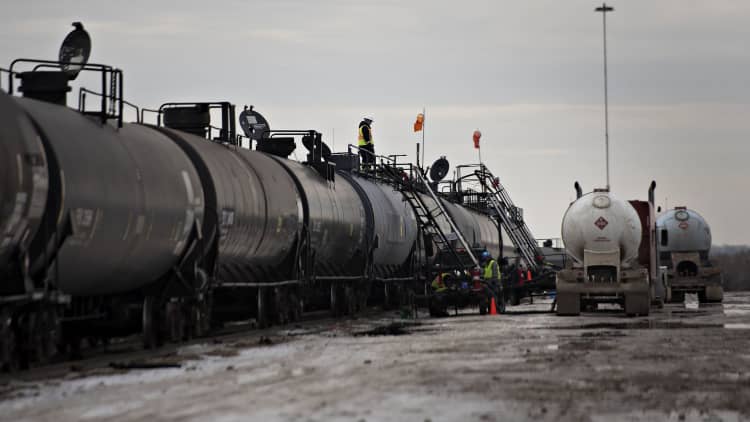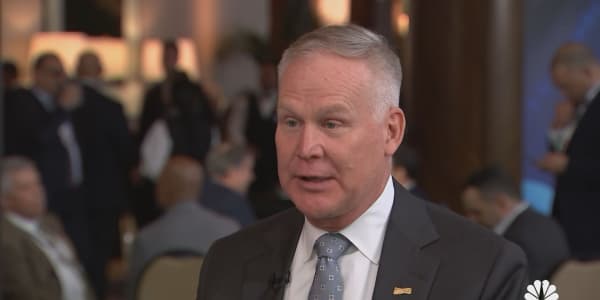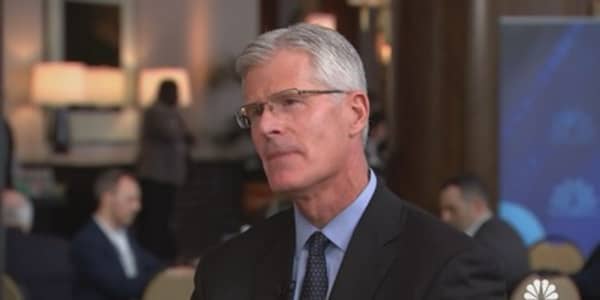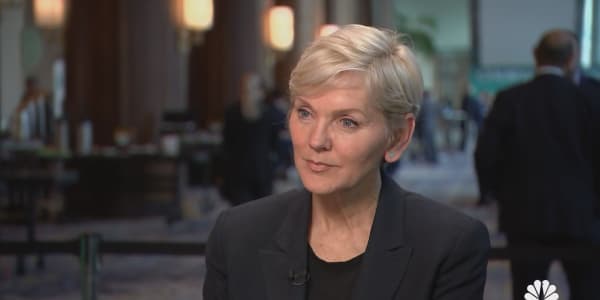Sanctions against Russia so far seem to be hobbling its longer-term energy projects, but those sanctions may be tougher to maintain if the conflict stretches on indefinitely.
U.S. and international industry officials, in Houston for the annual IHS CERAWeek energy conference, say they are complying with sanctions against Russia for its invasion of Ukraine and will continue to follow the restrictions. The sanctions strategically target important areas of promise for Russia's energy industry, like Arctic exploration and deep-water and unconventional drilling.
Russia continues to supply Europe and Ukraine with energy, even with a political standoff over the future of Ukraine. Europe is Russia's biggest export market.
"Actually, we are in a very strange war. On one side, people are dying," said Volodymyr Demchyshyn, Ukraine Minister of Energy and Coal. "On the other side, we are making deals, given the massive dependence on energy resources we are buying from Russia. We are buying nuclear fuel; we are buying gas; we are buying coal. All those deals are done simultaneously and on economic conditions. We are able to do good deals. The whole story with this war is very strange."
Demchyshyn said Ukraine is also importing Russian gas that travels to Europe and back, but its transportation of Russian fuel has dropped, leaving it with spare pipeline capacity. "Luckily, no major pipelines are occupied in this area. The war has not impacted gas transportation pretty much at all. But you see Ukraine is located between these two players (Europe and Russia)." He said Ukraine continues to transport oil to Europe from Russia, but much less than before the invasion of Crimea.
Read MoreRussia's Gazprom turns to China for growth
Georgetown University Professor Angela Stent, who speaks at the conference Friday, said so far companies are complying with the sanctions, but the pressure on some customers of Russian energy may ultimately force them to question the restrictions if the situation continues for a long time. She expects the U.S., however, to continue to press sanctions as long as Russian President Vladimir Putin continues aggression against Ukraine.
Russia sanctions' ripple effect
"I'm not sure how much patience all these companies have," said Stent, director of Georgetown's Center for Eurasian, Russian and East European Studies. "There's pressure starting from Greece and Spain and Italy and Hungary that they want to improve the relationship with Russia." She said so far they're "being kept in line" and cooperating with the sanctions.
She said it's possible the situation between Russia and Ukraine could worsen, as Russia seems to be moving on the Mariupol Port, strategically located for access to Crimea.
"The question is, are they going to escalate it? There are some signs they are escalating with the troop buildup and equipment. There are signs they are targeting the port," she said. "A lot of people think they are going to wait for the May Day celebration on May 9 and then they're going to escalate."
Read MoreWhy the oil-price collapse changes everything: Yergin
She said that is the celebration of the big victory in Europe 70 years ago, and this year no European leaders will attend. On the 60th anniversary, President George W. Bush attended, and President Bill Clinton attended 10 years earlier. Instead, the celebration will be attended by China and North Korea. "People think if there's another assault, they're going to wait until that's over," she said, adding that the same type of speculation circulated previously, with Russian Easter as a deadline.
Russia has been helped by the collapse of the rouble. … It means that $50 oil gets you almost as many as $100 did before.Daniel YerginIHS vice chairman
"We're fully complying," ExxonMobil Rex Tillerson told the conference, a comment echoed by other major producers. "I do think wisely there was recognition by the U.S. government that Russia is an important energy supplier." He said the sanctions only affect the company's frontier developments and do not impact the ongoing Sakhalin project.
Both Lukoil and Novatek, independent Russian companies, told the conference they are feeling the sting of the sanctions. "We feel the impact of sanctions, but we need some time for Russia and the industry to adjust," said Lukoil CEO and founder Vagit Alekperov. Alekperov disagrees that the 'tight sands' exploration his company is carrying out is actually covered by sanctions on unconventional drilling.
And Novatek, building a large LNG plant, said the sanctions slowed some of its activities since it had Americans, including its former lawyers, involved in the process. Novatek Chief Financial Officer Mark Gyetvay said one way sanctions affected the company was that it now is generating 35 percent of funding from its stakeholders, as opposed to an earlier plan for 30 percent. The balance is coming from external financing, including Chinese banks.
Read MoreEnergy industry must cut unsustainable costs: Statoil CEO
Novatek is planning to sell a 9 percent stake in its Yamal LNG, Russia's most promising LNG project, based in the Russian Arctic. Gyetvay said the company had received a promising offer and that the possible sale has nothing to do with sanctions. Partners in Yamal include Total and China National Petroleum.
As for the day-to-day for Russia's energy industry, "Russian oil production is flat," said Matt Sagers, head of Russian and Caspian Energy Research at IHS. He expects Russian production to decline, but future sources of oil needed to maintain production levels years out are being hindered. "In the future, you're going to have a hole" if it continues, he said.

On Wednesday the European Union accused Russia's state-owned Gazprom of hurting competition and charging unfair prices in different countries in central and Eastern Europe. Gazprom dismissed those allegations as unfounded and said it expects a political resolution.
Gazprom provides about 30 percent of Europe's natural gas supplies. Russian deliveries to Europe are expected to decline from 2016 to 2020 as the continent increasingly turns to liquefied natural gas supplies, which are becoming more available.
Europe has been looking to diversify away from Gazprom's stronghold on the market.
"Germany and Europe don't want to put all their eggs in one basket, and we will try get more independent from one supplier—Russia," said Holger Lösch, a member of the executive board of BDI, an association of German corporations. Lösch said the German companies are accepting the German government's position on Russian sanctions. "The law has to be put above profits," he said.
Read MoreHarold Hamm: World's crazy oil policy
"The Germans are trying, but there's going to be a lot of pressure as time goes on," Georgetown's Stent said.
Stent said the sanctions were done in a way that they would be staggered. "They were deliberately done in a way that was not a full onslaught," she said.
Russia so far is maintaining its position as the world's largest oil producer, at 10.6 million barrels a day. Saudi Arabia is second, producing about 10 million barrels a day in April. The U.S. is third, producing more than 9 million barrels a day over the past several months.
"Bizarrely, Russia has been helped by the collapse of the rouble. … It means that $50 oil gets you almost as many as $100 did before," said Daniel Yergin, IHS vice chairman. He said what it has meant for some Russian service companies is that they can maintain their budgets.





